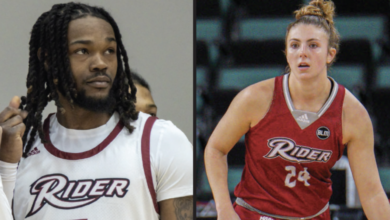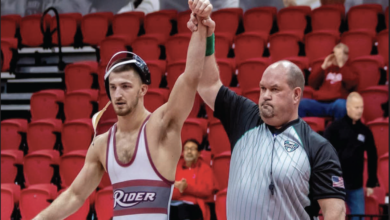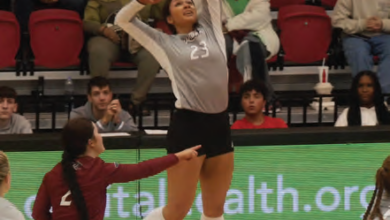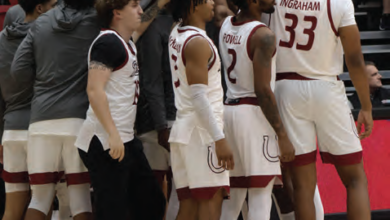How Saint Peter’s helped the MAAC
By Dylan Manfre and Shaun Chornobroff
Metro Atlantic Athletic Conference (MAA) Commissioner Rich Ensor and his wife, who wore a MAAC branded jacket, were shopping in a Raymour and Flanagan. Ensor did not actively promote or show that he is the head honcho of an NCAA conference.
When a patron started talking about Saint Peter’s and the conference, his wife chimed in and said “that’s our conference,” to the man who Ensor said had no connection with the tiny Jersey City university.
Any conversation about Saint Peter’s University was scarce until the Peacocks went farther than any MAAC school had before in the NCAA Tournament.
Saint Peter’s became a household name after a miraculous run to the Elite Eight after they won a fully-functional conference tournament in Atlantic City, New Jersey, which for the first two years, had been suffocated by the cloak of a pandemic.
“Now here comes Saint Peter’s — great excitement. Well, that’s going to translate into next year into more brand awareness in the marketplace,” said Ensor who is an alumnus of the school and was a former sports information director. “People are excited about us coming back … hopefully it shows up at the gate.”
A Perfect March
Atlantic City in March of 2020 was supposed to be the dawn of a new era for MAAC basketball. Moving the conference tournament from Albany, New York to the New Jersey vacationing hotspot was supposed to make the tournament a better experience for fans, as well as a more neutral location for the MAAC schools.
COVID-19 swiftly made that more difficult for the conference, completely shutting down the tournament while still in its opening stages in 2020 and limiting attendance to family and friends in 2021.
In a much more normalized scene, the MAAC finally got to see the potential Atlantic City offers this past March. Combining the tournament’s success with Saint Peter’s unprecedented run, what eventually became reality was far-fetched in the minds of most when the month first started.
“It doesn’t get any better unless they won the whole [NCAA Tournament],” Ensor said with a smile. “For Atlantic City, they invested in the MAAC and they’ve been good partners through some weaning days.”
The successful tournament comes after the MAAC experienced losses over the previous two years as a result of the pandemic. Ensor estimated the conference incurred a loss of $400,000 in the 2020 fiscal year.
The New Jersey schools took over Atlantic City on the men’s side with three of four semi finalists being from the state. Saint Peter’s, Monmouth — who is departing the MAAC for the Colonial Athletic Association (CAA) — and Rider.
Rider had its own Saint Peter’s-esque upset, taking down tournament favorite and top-seed Iona on a game-winning shot with less than 10 seconds left.
With Monmouth leaving the conference, the postseason performances from Rider and Saint Peter’s were more important than ever.
“We need, with Monmouth leaving, for Rider and Saint Peter’s to have a good presence in Atlantic City,” Ensor said. “It’ll help with that process and I think overall, it was a really good feeling for the MAAC what came out of that.”
Respect your mid-majors
The brass of Rider men’s basketball and the athletic department are not immune to knowing a Saint Peter’s esque run will happen again. Head Coach Kevin Baggett said it was all but inevitable.
“What [former Saint Peter’s Head Coach Shaheen Holloway] did set the precedent, set the bar, but I won’t be surprised if there’s another 15-seed down the road that comes along and does the same thing they’re doing,” Baggett said.
Baggett cited the revolving door of college basketball transfers leveling the playing field for mid- majors. Players who do not succeed at Power Five institutions leave for a mid-major program in hopes of a better opportunity.
He experienced this too a few short years ago when Frederick Scott joined Rider after leaving the Big East and DePaul University. More recently the MAAC has seen examples of this when Walker Miller and Shavar Reynolds left the University of North Carolina and Seton Hall, respectively, for Monmouth.
Harnum took the perspective of a fan. As a former coach and now leader of a Division I athletic department, a mid-major upset in the NCAA tournament is what cultivates the allure of each year.
“You need that opening weekend where people see teams they’ve never seen before and are like ‘Holy cow, somebody’s upset somebody,’” Harnum said. “That’s what makes March Madness the enormous [event] that it is.”



